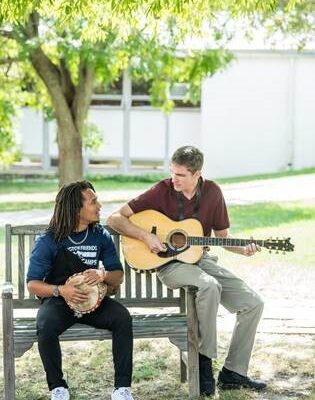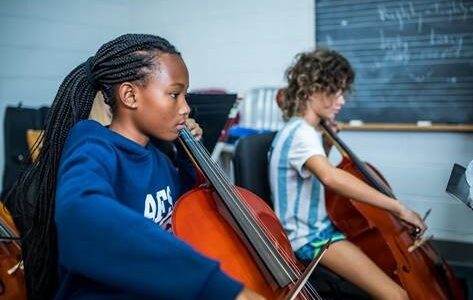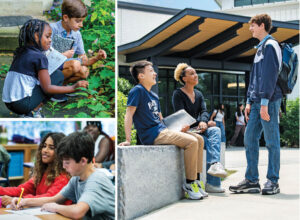The gift of music education is one of the best investments parents can make for their children. Not all children have an interest in music, but, music lessons integrated into an emergent curriculum can develop a new perspective on music. In fact, music lessons for kids have been tied to some amazing social and individual developments over the years. Once you get to see those results in person, it’s hard to dispute the positive role music plays in children’s lives.
At Abington Friends School, we are committed to teaching children not just how to create music but how to appreciate it. Far too many schools focus on passing on the technicalities rather than an understanding of music within the context of other subjects. Here are a few of the most important benefits of music education.
1. Exercises the Brain
According to PBS.org, the brain works differently for people who play music versus those who do not. This is true even for young children who are only just starting to understand rhythms and sounds. In fact, research shows that children who play an instrument or experience some sort of musical instruction show more neural activity compared to non-musicians. They also tend to have higher IQs.
A TIME article confirms this finding and adds that students eventually learn to distinguish sounds they could not previously hear. It referred to this as a neurophysiological distinction. The article also added that exercising these brain muscles correlated with better grades in school.
2. Helps with Language Development
American neighborhoods and workplaces are becoming increasingly multicultural. The combination of Spanish language lessons and music lessons starting at age 3 at Abington Friends leads to amazing intellect and cultural knowledge which benefits students’ social lives and future careers. PBS reports that learning to play music teaches children language development skills that will serve them well later on in life.
While learning a language helps to set children up for future success, the experts add that these skills need reinforcement and practice to last. How does music help with this at all? The left side of the brain is associated with language capabilities, and this is the same side of the brain music exercises. Also, children do not only play music in classes; they learn to read it too.
3. Improves Memory
We live in a society where children and adults alike have grown forgetful. The distractions of technology and more multi-tasking do not help to make this any better. Music helps children to slow down, turn off the devices, and focus in a fun way. To do this, students tackle tasks such as reading notes, listening for sounds, and memorizing lyrics which all require exercising their memory skills and stretching them to infinite limits.
Playing music requires memory at both the psychological and physical levels. Students need to remember what notes to play and when. The coordination necessary to pull this off is also important as each move of a finger leads to the creation of a specific sound.
4. Boosts Confidence
Children tend to thrive when they find at least one thing they are good at and can feel confident about. There are so many instruments associated with music that it is highly likely a child will find one that resonates with them. In fact, even when children do not focus on playing a specific instrument, they build confidence anyway just by enjoying hearing music and moving to the beats and rhythms.
The lessons your children take play a role. AFS music teachers really show their passion for music and encourage their students to enjoy the journey of learning about music rather than the main focus of perfecting one skill. This encourages many children to desire to learn more rather than feeling discouraged and falling out of love with music as they get older.
5. Teaches Discipline
Parents often turn to sports to teach children discipline, but not every child has the desire to play. Children facing disabilities that result in limited mobility might also miss out on this opportunity. Music helps to fill some of these learning gaps left behind or can even work in conjunction with movement martial arts.
Music also has rules that, when followed, lead to the creation of art. Children must learn how to hold their instruments and how to place their fingers. The fact that learning to play an instrument requires patience also further instills discipline.
6. Offers Creative Expression
Students develop self-awareness and taste in music class. They are provided choices about which instrument they learn to play and as they get older they can choose songs that speak to them personally. Being able to participate in music classes offers more opportunities for self-expression through song, dance, and movement.
These are just a handful of the many known benefits of music classes for children. As your child continues to develop their music skills and talents, you will notice some unique positive changes in their behavior and your relationship with them. Are you ready to give your child the gift of an integrated music curriculum? Contact us today for more information.
Music is an essential part of our children’s education. Music education develops the soul and helps our students become complete, caring and dynamic human beings.” – Mark Kraft, Director of Instrumental Music at Abington Friends School
“Music education is valuable not simply because it helps to amplify the skills learned in other spaces. Music education is unique and special because it connects the mind to spirit. It creates an opportunity for students to cultivate life skills such as empathy, collaboration, compassion and stewardship. Music encourages us to look beyond ourselves and to observe how we can contribute to the greater good. It reminds us that every voice counts, both individually, to be heard on its own, and within the ensemble that is our community.” – Keisha Hirlinger, Lower School Music Teacher at Abington Friends School


